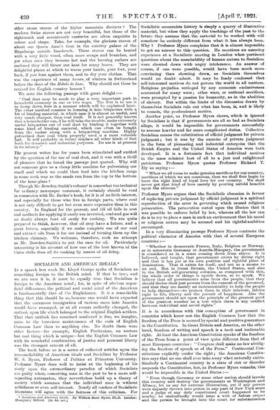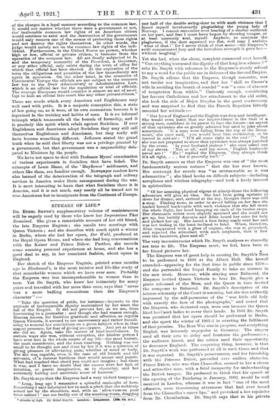SOCIALISM AND AMERICAN IDEALS.*
Ix a speech last week Mr. Lloyd George spoke of Socialism as something foreign to the British mind. If that be true, and- we are sure it is, it must be equally true that Socialism is foreign to the American mind ; for, in spite of obvious super- ficial differences, the political and social mind of the American is fundamentally that of the Englishman. It is a remarkable thing that this. should be so, because one ‘woukl have expected that the enormous immigration of various races into America would, have swamped, or at all events radically changed, the outlook upon life which belonged to the original English settlers. That that outlook has remained unaltered is duo, we imagine, more to the tenacious maintenance of the code of English Common Law than to anything else. No doubt there were other factors—for example, English Puritanism, an austere but real thing which is unique—but the English Common Law with its wonderful combination of justice and personal liberty was the strongest cement of all.
The book -before us is a series -of collected articles upon the irreconcilability of American ideals and Socialism by Professor W. S. Myers, Professor of Politics at Princeton University. Professor Myers does -well to insist at the beginning of his study upon the -extraordinary paradox of which Socialists are guilty when; conceiving mania the past to be a mere self- regarding automaton,• they nevertheless build up a -theory of society which assumes that the individual- man is without selfishness or even self-interest. Nearly all readers of Socialistic literature will agree with the fairness of this criticism. For
• Socialism and American Ideals. By William Starr ;flyers. Ph.D. London; Humphrey Milford. lts. Od. net.1 Socialistio economists -history is simply a quarry of illustrative material, but when they -apply the-teachings of the past--to the future they assume that the, material to be -worked -with will somehow -be ,entirely different from what it has always been. Why ? Professor Myers complains that it is almost impossible to- -get an answer to-.this-question.. He -mentions an amusing experience at a Socialistic meeting in London when-pertinent questions about the unsuitability of human nature to- Socialism were shouted down with angry intolerance.• An- answer of course, -if one were possible, would . have - been- much more - convinoing than shouting down, as - Socialists themselves would no doubt-= admit, It may be freely confessed that self-interested- motives do not govern the world in all matters. Religious prejudice untinged by any economic exclusiveness accounted for many wars ; other wars, or national-sacrifices, were prompted- by a passion for humanity, as:in the abolition of slavery. But within the limits of the discussion drawn by themselves Socialists rule out what has-been, is, and is -likely to remain, the-predominant motive.
Another point, as Professor Myers shows, which is ignored by Socialists is that if governments are all so bad as Socialists allege, it would be impossible for governments successfully to assume heavier and far more complicated duties. Collective Socialism means the substitution of official judgment for private judgment ; but it was by the exercise of. private judgment in the form of pioneering and industrial enterprise that the British -Empire- and.-the United- States -of America were both developed. It is a fortunate fact that individual_ motives in the mass minister best of all to a just and enlightened patriotism. Professor Myers. quotes Professor Richard T. Ely as saying r-
" When we all come to make genuine sacrifices for -our country; sacrifices of 'which we are conscious, then we shall first begin to have the right kind of loyal love for our country. We shall never get that kind of love merely by pouring untold benefits upon the citizens."
Professor Myers argues that the Socialistic obsession in favour of replacing private judgment by official judgment is a spiritual reproduction of the error in governing which caused religious persecution. The persecution rested upon the illusion that it was possible to enforce belief by law, whereas all the law can do is to try to place a man in such an environment that his moral or religious nature may be aroused and his rightful ambition encouraged.
In a very illuminating passage-Professor Myers contrasts the political -character of. America with that of several. European countries 1-- " Whether in democratic France, Italy, Belgium or Norway, or in autocratic Germany or Austria-Hungary, the government is considered as in a sense coming down from above. It is believed,. and taught, that government exists by divine right and that it has per as its own position and rightful place of domination. That it exists for itself, and not as a means to an end. But. in Great Britain, the United States, and also in the British self-governing colonies, as compared: with this, the whole order of things is upside down, so to speak. We believe that all governments arise from the people, that they should derive their just powers from the consent of the governed, and that they are merely an instrumentality to help; the people to help themselves—to protect them in their inherent, unborn right to life, liberty and the pursuit of happiness. Also the government should act upon the principle of the greatest good of the greatest number as a •test. -when there •is any conflict between individual and social rights."
It is in accordance with this conception of government in countries which know not the English Common Law that the freedom of the Press is secured by special and- positive-guarantees in the Constitution. In Great Britain and-America, on the other hand, freedom of writing and speech is a tacit and inalienable right. At least the American Constitution speaks of the freedom of the Press from a point of view quite different from that of most European countries : " Congress shall make no law abridg- ing the freedom of speech .or of the Press." Continental Con- stitutions explicitly confer the right ; the American Constitu- tion says that no one shall ever take away what naturally exists. Similarly a Continental country in a state of riot- or -disorder suspends the Constitution, but, as Professor Myers remarka,-thia would be impossible in the United States :— " Even though Germany or some other nation should invade this country and destroy the governments at Washington-and Albany, let us say for extreme illustration, yet if any person were unjustly thrown into prison in any part of Now York state and a judge of any duly constituted court happened to be nearby, he undoubtedly would issue a writ of habeas corpus and the person be brought into the court for substantiation of the charges in a legal -manner according to the common law. It would not matter whether there were a government or not, the inalienable common law rights of an American citizen would continue to exist and the destruction of the government would only remove one of the means of protecting these rights and not destroy the rights themselves. In other words, the judge would merely act on the common law rights of the indi- vidual. Furthermore, in the United States no person, whether high or low, official or private citizen, is immune from the operation of the common law. All are finally subjected to it, and the temporary immunity of the President, a Governor, or any other official, only exists during the term of office for which that official has been elected. At the expiration of the term the obligations and penalties of the law immediately are again in operation. On the other hand, in the countries of Continental Europe the officials are not subject to the common law but to the Droit Adminietratif or Administrative Law, which is an official law for the regulation or trial of officials. The average European would consider it almost an act of,saori- lege to hale an official into court like any other private citizen."
Those are words which every American and Englishman may well read with pride. It is a majestic conception this, a state of law going on, as it were, of its own momentum because it is ingrained in the training and habits of man. It is an informal triumph which transcends all the bounds of formality, and it is precisely this spirit which rebels against Socialism. If ever Englishmen and Americans adopt Socialism they may still call themselves Englishmen and Americans, but they really will have become something different. Jefferson stated the grand truth when he said that liberty was not a privilege granted by
a government, but that government was a responsibility dele- gated to Ministers by the people.
We have not space to deal with Professor Myers examination of various experiments in Socialism that have failed. The attempts of Louis Blanc, of the Mayflower' settlement, and others like them, are familiar enough. Newspaper readers have also learned of the deterioration of the telegraph and railway
services in America under State management during the war. It is most interesting to learn that what Socialism there is in America, and it is not much, may- nearly all be traced not to
true Americans but to immigrants from the Continent of Europe.



































 Previous page
Previous page